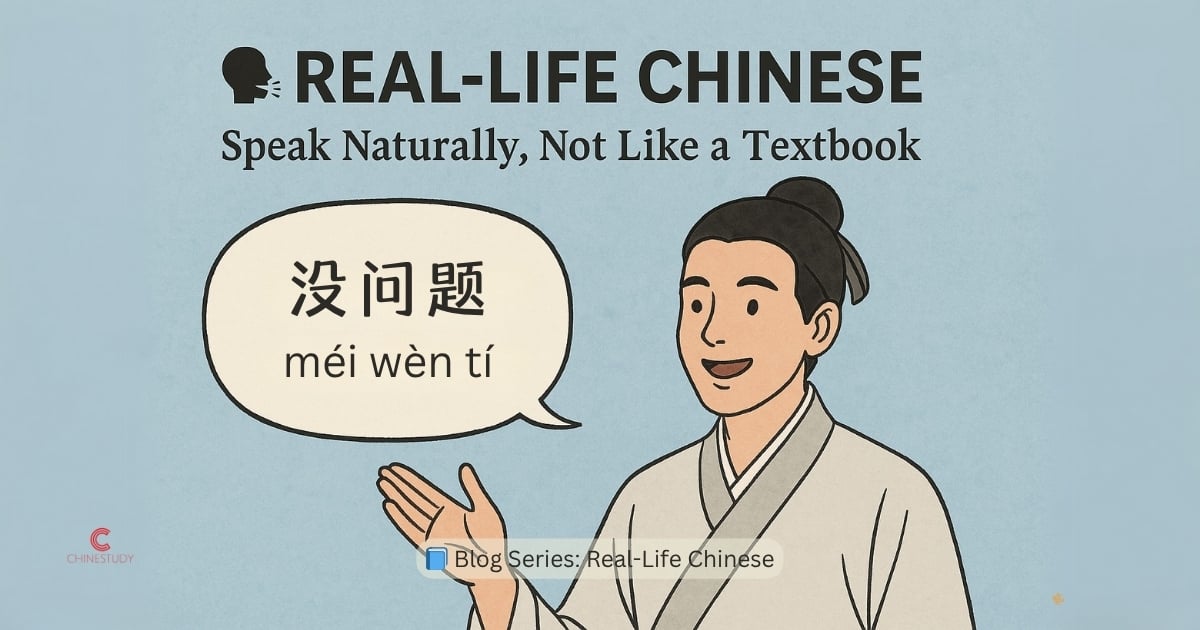How to Say “Okay” Casually in Chinese — Not Just “可以”

Want to sound more native? Start here.
🚫 Textbook Chinese
可以 (kěyǐ) = can / may / okay
It’s technically correct… but sounds a bit too formal or stiff in casual conversations.
If someone says:
- “你可以帮我吗?(Nǐ kěyǐ bāng wǒ ma?)”
And you answer:
- “可以。(Kěyǐ.)”
It feels distant — like you’re giving permission, not just casually saying “sure.”
✅ Real Chinese
Native speakers often say:
- 行 (xíng) – OK / Sure
- 没问题 (méi wèntí) – No problem
- 好的 (hǎo de) – Alright / OK
These feel more friendly, relaxed, and natural in everyday talk.
🔍 Break It Down
- 行 (xíng) → simple, direct, super common
- 没问题 (méi wèntí) → reassures the other person
- 好的 (hǎo de) → polite and agreeable
💡When to Use Them
Use these casual expressions instead of formal “可以 (kěyǐ)” when someone is asking for:
✅ A favor – When someone asks you to help them do something.
Example:
- “能帮我一下吗?” (Néng bāng wǒ yíxià ma?) – Can you help me for a second?
- “没问题!” (Méi wèntí!) – No problem!
✅ A plan – When you’re agreeing to go somewhere or do something.
Example:
- “七点出发行吗?” (Qī diǎn chūfā xíng ma?) – Is 7 o’clock okay for departure?
- “行!” (Xíng!) – Sure!
✅ A confirmation – When someone checks if something is okay with you.
Example:
- “我晚上给你打电话,好吗?” (Wǒ wǎnshàng gěi nǐ dǎ diànhuà, hǎo ma?) – Can I call you tonight?
- “好的!” (Hǎo de!) – Okay!
These replies are short, friendly, and natural — perfect for real-life Chinese conversation.
🧱 Example Sentences
1. - 我们周五见面,可以吗?
(Wǒmen zhōuwǔ jiànmiàn, kěyǐ ma?)
Can we meet on Friday?
- “行!”
(Xíng!)
Sure!
2. - 我可以用一下你的手机吗?
(Wǒ kěyǐ yòng yíxià nǐ de shǒujī ma?)
Can I use your phone for a second?
- 没问题!
(Méi wèntí!)
No problem!
3. - 你下午三点有空吗?我想聊一聊。
(Nǐ xiàwǔ sān diǎn yǒu kòng ma? Wǒ xiǎng liáo yì liáo.)
Are you free at 3pm? I’d like to talk.
- 好的。
(Hǎo de.)
Okay.
🤓 Why It Sounds Better
- Feels more natural and friendly
- Matches the way people speak in real life
- Makes you sound like someone used to real conversation — not just classroom language
⚠️ Common Mistake
🚫 Always replying with “可以。(Kěyǐ.)”
It’s OK, but it’s not what people usually say in relaxed conversation.
Switch it up with 行 (xíng) / 没问题 (méi wèntí) / 好的 (hǎo de) to sound more natural.
🏆 Quick Practice
Q: 你能帮我开一下门吗?
(Nǐ néng bāng wǒ kāi yíxià mén ma?)
Can you open the door for me?
Which answer sounds better?
A. 可以。(Kěyǐ.)
B. 没问题!(Méi wèntí!)、
✅ Correct Answer: B – It’s casual, warm, and sounds like how real people talk.
✨ Final Thoughts
“可以 (kěyǐ)” is safe — but if you want to blend in with real Chinese conversations, try:
👉 行 (xíng)
👉 没问题 (méi wèntí)
👉 好的 (hǎo de)
They’re short, simple, and perfectly natural.
🔎 Want more real-life Chinese tips? Check out the full blog series: Real-Life Chinese
Thank you for subscribing!
Have a great day!